| Listing 1 - 10 of 15 | << page >> |
Sort by
|
Multi
ISBN: 9789087040833 9087040830 Year: 2009 Publisher: Hilversum : Verloren,
Abstract | Keywords | Export | Availability | Bookmark
 Loading...
Loading...Choose an application
- Reference Manager
- EndNote
- RefWorks (Direct export to RefWorks)
Sculpture --- Roman emperors --- Emperors --- Empereurs --- Portraits --- Rome --- History --- Histoire --- Gender identity

ISBN: 1134735456 1134735464 1280151080 0203982312 9780203982310 9780415154031 0415154030 6610151083 9786610151080 0415154030 9781134735419 9781134735457 9781134735464 9781138007031 Year: 1999 Publisher: London New York Routledge
Abstract | Keywords | Export | Availability | Bookmark
 Loading...
Loading...Choose an application
- Reference Manager
- EndNote
- RefWorks (Direct export to RefWorks)
The Rome that Did Not Fall provides a well-illustrated, comprehensive narrative and analysis of the Roman empire in the east, charting its remarkable growth and development which resulted in the distinct and enduring civilization of Byzantium. It considers:* the fourth century background* the invasions of Attila* the resources of the east* the struggle for stability* the achievements of Anastasius.
Emperors --- Byzantine emperors --- Caesars --- Decennalia --- Roman emperors --- Byzantine Empire --- Rome --- Europe --- History
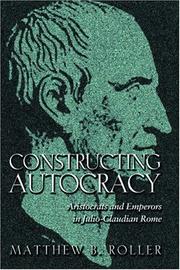
ISBN: 069105021X 9780691171418 1336196025 1400824095 0691171416 1400814561 1400817757 Year: 2001 Publisher: Princeton (N.J.) : Princeton university press,
Abstract | Keywords | Export | Availability | Bookmark
 Loading...
Loading...Choose an application
- Reference Manager
- EndNote
- RefWorks (Direct export to RefWorks)
Rome's transition from a republican system of government to an imperial regime comprised more than a century of civil upheaval and rapid institutional change. Yet the establishment of a ruling dynasty, centered around a single leader, came as a cultural and political shock to Rome's aristocracy, who had shared power in the previous political order. How did the imperial regime manage to establish itself and how did the Roman elites from the time of Julius Caesar to Nero make sense of it? In this compelling book, Matthew Roller reveals a "dialogical" process at work, in which writers and philosophers vigorously negotiated and contested the nature and scope of the emperor's authority, despite the consensus that he was the ultimate authority figure in Roman society.Roller seeks evidence for this "thinking out" of the new order in a wide range of republican and imperial authors, with an emphasis on Lucan and Seneca the Younger. He shows how elites assessed the impact of the imperial system on traditional aristocratic ethics and examines how several longstanding authority relationships in Roman society--those of master to slave, father to son, and gift-creditor to gift-debtor--became competing models for how the emperor did or should relate to his aristocratic subjects. By revealing this ideological activity to be not merely reactive but also constitutive of the new order, Roller contributes to ongoing debates about the character of the Roman imperial system and about the "politics" of literature.
Aristocracy (Political science) --- Class consciousness --- Emperors --- Rome --- History --- Aristocracy --- Political science --- Caesars --- Decennalia --- Roman emperors --- Consciousness --- Social perception --- Social classes
Book
ISBN: 3760840566 9783760840567 Year: 1976 Publisher: Zürich Artemis
Abstract | Keywords | Export | Availability | Bookmark
 Loading...
Loading...Choose an application
- Reference Manager
- EndNote
- RefWorks (Direct export to RefWorks)
Roman history --- Roman emperors --- Emperors --- Emperors. --- Kaiser. --- Keizers. --- Romeinse rijk. --- Usurpatoren. --- Wörterbuch. --- Rome (Empire). --- Römisches Reich. --- Romeinse keizer --- Antiquity --- Romeinse geschiedenis
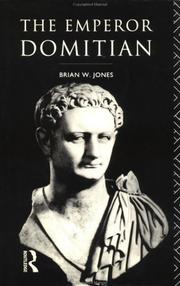
ISBN: 0415042291 Year: 1992 Publisher: London New York : Routledge
Abstract | Keywords | Export | Availability | Bookmark
 Loading...
Loading...Choose an application
- Reference Manager
- EndNote
- RefWorks (Direct export to RefWorks)
Emperors --- Biography. --- Domitian, --- Rome --- History --- -Rulers --- Sovereigns --- Heads of state --- Kings and rulers --- Monarchy --- Biography --- Domitian Emperor of Rome --- -Emperors --- Empereurs --- Biographies --- Domitien, --- Histoire --- Domicyan, Tytus Flawiusz, --- Domitianus, Titus Flavius, --- Domitian --- Domitian, 81-96 --- Domitian, Emperor of Rome, 51-96. --- Rome - History - Domitian, 81-96. --- Roman emperors - Biography.
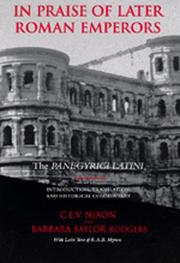
ISBN: 0520083261 9780520083264 Year: 1994 Volume: 21 Publisher: Berkeley (Calif.) : University of California press,
Abstract | Keywords | Export | Availability | Bookmark
 Loading...
Loading...Choose an application
- Reference Manager
- EndNote
- RefWorks (Direct export to RefWorks)
Speeches, addresses, etc., Latin --- Speeches, addresses, etc., Latin. --- Emperors --- Discours latins --- Empereurs --- Translations into English. --- History and criticism. --- Biography --- Traductions anglaises --- Histoire et critique --- Biographies --- Rome --- History --- Sources. --- Histoire --- Sources --- Roman emperors --- History and criticism --- -Speeches, addresses, etc., Latin --- -Emperors --- -Rulers --- Sovereigns --- Heads of state --- Kings and rulers --- Monarchy --- Latin orations --- Latin speeches --- Translations into English --- -Sources. --- Discours latins médiévaux et modernes --- Latin prose --- Histoire et critique. --- Speeches --- Panégyriques latins --- Traductions anglaises. --- -History and criticism --- Speeches. --- Rulers --- Rim --- Roman Empire --- Roman Republic (510-30 B.C.) --- Romi (Empire) --- Byzantine Empire --- Rome (Italy) --- Czars (Emperors) --- Tsars --- Tzars --- Speeches, addresses, etc., Latin - Translations into English --- Roman emperors - Biography --- Speeches, addresses, etc., Latin - History and criticism --- Rome - History - Empire, 284-476 - Sources
Book
ISBN: 9780520248953 0520248953 0520287592 0520943147 1283331837 9786613331830 9780520943148 9780520287594 Year: 2011 Publisher: Berkeley: University of California press,
Abstract | Keywords | Export | Availability | Bookmark
 Loading...
Loading...Choose an application
- Reference Manager
- EndNote
- RefWorks (Direct export to RefWorks)
The infamous emperor Caligula ruled Rome from A.D. 37 to 41 as a tyrant who ultimately became a monster. An exceptionally smart and cruelly witty man, Caligula made his contemporaries worship him as a god. He drank pearls dissolved in vinegar and ate food covered in gold leaf. He forced men and women of high rank to have sex with him, turned part of his palace into a brothel, and committed incest with his sisters. He wanted to make his horse a consul. Torture and executions were the order of the day. Both modern and ancient interpretations have concluded from this alleged evidence that Caligula was insane. But was he? This biography tells a different story of the well-known emperor. In a deft account written for a general audience, Aloys Winterling opens a new perspective on the man and his times. Basing Caligula on a thorough new assessment of the ancient sources, he sets the emperor's story into the context of the political system and the changing relations between the senate and the emperor during Caligula's time and finds a new rationality explaining his notorious brutality.
Emperors --- Caligula, --- Rome --- History --- Gaius Caesar Germanicus, --- Gaius, --- Gaius, Julius Caesar Germanicus, --- Caligola, --- Ḳaligulah, --- קאליגולאה, --- קאליגולא, --- קאליגולה --- Kaligula, --- Biography --- Emperors - Rome - Biography --- Caligula, - Emperor of Rome, - 12-41 --- Rome - History - Caligula, 37-41 --- ancient history. --- ancient rome. --- ancient sources. --- biography. --- brutality. --- caligula. --- career. --- classical period. --- dark. --- dramatic. --- engaging. --- famous tyrant. --- general audience. --- historical analysis. --- history buffs. --- history. --- human cruelty. --- intense. --- mental illness. --- military. --- nobility. --- nonfiction. --- notorious figures. --- political science. --- political system. --- political thriller. --- politics. --- questioned sanity. --- revolt. --- roman emperors. --- roman politics. --- roman senate. --- rome. --- torture. --- tyrant. --- world history. --- worship.
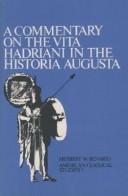
ISBN: 0891303928 089130391X 9780891303923 Year: 1980 Volume: 7 Publisher: Chico (Calif.): Scholars Press,
Abstract | Keywords | Export | Availability | Bookmark
 Loading...
Loading...Choose an application
- Reference Manager
- EndNote
- RefWorks (Direct export to RefWorks)
Hadrian --- Rome --- History --- Hadrian, 117-138 --- Emperors --- Biography --- Scriptores historiae Augustae. De vita Hadriani. --- Hadrian, Emperor of Rome, 76-138. --- Rome - History - Hadrian, 117-138. --- Roman emperors - Biography. --- Czars (Emperors) --- Rulers --- Sovereigns --- Tsars --- Tzars --- Kings and rulers --- Biography&delete& --- History and criticism. --- Hadrian, --- Adrian, --- Hadrianus, --- Adriano, --- Hadrien, --- אדריאנוס, --- Scriptores historiae Augustae. --- Rim --- Roman Empire --- Roman Republic (510-30 B.C.) --- Romi (Empire) --- Byzantine Empire --- Rome (Italy) --- Historiography. --- History and criticism --- Scriptores historiae Augustae --- Historiography --- Biography&delete&&delete& --- Emperors - Rome - Biography - History and criticism --- Hadrian, - Emperor of Rome, - 76-138 --- Rome - History - Hadrian, 117-138 - Historiography
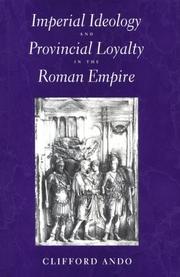
ISBN: 0520923723 1597346721 9780520923720 0585394598 9780585394596 0520220676 9780520220676 9781597346726 Year: 2000 Publisher: Berkeley University of California Press
Abstract | Keywords | Export | Availability | Bookmark
 Loading...
Loading...Choose an application
- Reference Manager
- EndNote
- RefWorks (Direct export to RefWorks)
The Roman empire remains unique. Although Rome claimed to rule the world, it did not. Rather, its uniqueness stems from the culture it created and the loyalty it inspired across an area that stretched from the Tyne to the Euphrates. Moreover, the empire created this culture with a bureaucracy smaller than that of a typical late-twentieth-century research university. In approaching this problem, Clifford Ando does not ask the ever-fashionable question, Why did the Roman empire fall? Rather, he asks, Why did the empire last so long? Imperial Ideology and Provincial Loyalty in the Roman Empire argues that the longevity of the empire rested not on Roman military power but on a gradually realized consensus that Roman rule was justified. This consensus was itself the product of a complex conversation between the central government and its far-flung peripheries. Ando investigates the mechanisms that sustained this conversation, explores its contribution to the legitimation of Roman power, and reveals as its product the provincial absorption of the forms and content of Roman political and legal discourse. Throughout, his sophisticated and subtle reading is informed by current thinking on social formation by theorists such as Max Weber, Jürgen Habermas, and Pierre Bourdieu.
Allegiance --- Political stability --- Roman provinces --- State governments --- Destabilization (Political science) --- Political instability --- Stability, Political --- Consensus (Social sciences) --- Legitimacy of governments --- Loyalty, Political --- Political loyalty --- Loyalty --- Citizenship --- Patriotism --- Administration. --- Rome --- Rim --- Roman Empire --- Roman Republic (510-30 B.C.) --- Romi (Empire) --- Byzantine Empire --- Rome (Italy) --- History --- Influence. --- Cultural policy --- Allegiance - Rome. --- Political stability - Rome. --- administration. --- allegiance. --- ancient rome. --- ancient world. --- augustus. --- body politic. --- bourdieu. --- bureaucracy. --- central government. --- christian ideology. --- empire. --- fall of the empire. --- government. --- habermas. --- history. --- imperial identity. --- max weber. --- nonfiction. --- political consensus. --- political stability. --- politics. --- power struggle. --- power. --- provinces. --- provincial loyalty. --- revolt. --- roman emperors. --- roman empire. --- roman government. --- roman history. --- roman military. --- roman senate. --- rome. --- social formation.
Book
ISBN: 9780199747276 019974727X 019986621X 0199959706 9786612978555 1282978551 0199780919 9780199959709 Year: 2011 Publisher: New York: Oxford university press,
Abstract | Keywords | Export | Availability | Bookmark
 Loading...
Loading...Choose an application
- Reference Manager
- EndNote
- RefWorks (Direct export to RefWorks)
Roman history --- Christian church history --- anno 1-499 --- Christianity and other religions --- Church history --- Paganism --- Emperors --- Christianisme --- Eglise --- Paganisme --- Empereurs --- Roman. --- Relations --- Christianity. --- Religion romaine --- Histoire --- Rome --- History --- Roman --- Christianity --- Civilization, Pagan --- Heathenism --- Religions --- Caesars --- Decennalia --- Roman emperors --- Apostolic Church --- Church, Apostolic --- Early Christianity --- Early church --- Primitive and early church --- Primitive Christianity --- Fathers of the church --- Great Apostasy (Mormon doctrine) --- Syncretism (Christianity) --- Relations&delete& --- Christianity and other religions - Roman --- Church history - Primitive and early church, ca. 30-600 --- Christianity and other religions - Paganism - History - Early church, ca. 30-600 --- Paganism - Relations - Christianity --- Emperors - Rome --- Christianisme - Relations - Religion romaine --- Eglise - Histoire - ca 30-600 (Eglise primitive) --- Paganisme - Relations - Christianisme --- Empereurs - Rome --- Roma --- Religion --- Rome - History - Empire, 30 B.C.-476 A.D. --- Rome - Histoire - 30 av. J.-C.-476 (Empire) --- 30-600-(Église-primitive) --- 30 av. J.-C.-476 (Empire) --- 30-600-(Église-primitive)
| Listing 1 - 10 of 15 | << page >> |
Sort by
|

 Search
Search Feedback
Feedback About UniCat
About UniCat  Help
Help News
News